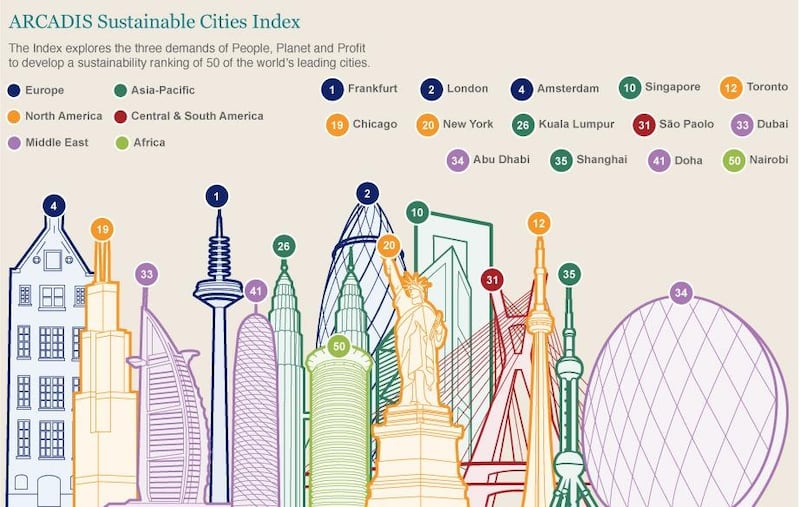DUBAI // Dubai and Abu Dhabi lead the Middle East in a sustainability ranking of 50 cities.
The Sustainable Cities Index report evaluates cities in 31 countries on their social, environmental and economic performance using data published by the United Nations, the World Bank, the World Health Organisation and the International Labour Organisation among others.
The top five cities – Frankfurt, London, Copenhagen, Amsterdam and Rotterdam – are all in Europe. Overall, seven of the top 10 performers are European, with the remainder being Seoul, Hong Kong and Singapore.
Dubai and Abu Dhabi lead the way among cities in their region, placed 33rd and 34th respectively, ahead of Doha which ranked 41st, and Jeddah and Riyadh – 43rd and 44th respectively.
Wuhan in China, India’s New Delhi and Nairobi in Kenya were the worst performers.
The ranking was prepared by Arcadis, a design and consultancy company, and the Centre for Economics and Business Research, a British economic forecasting consultancy.
“Dubai and Abu Dhabi will see an urban population growth of more than 80 per cent from now to 2030,” said Terry Tommason, city executive at Arcadis. “This growth will place tremendous stress on transport networks, water supply, waste collection systems, sewage systems and land values.”
The two UAE cities performed weakest in the environmental category, which looked at energy use and share of renewable energy, waste management, greenhouse gas emissions, air pollution, drinking water and sanitation and exposure to natural catastrophes. Abu Dhabi was ranked 44th, while Dubai came 47th.
“The cities are let down by their lack of renewable energy, even if progress has started in recent years,” said Mr Tommason.
Air pollution – including sandstorms – and the need for more recycling options also played a role in the rankings. Doha was the worst performer in terms of environmental indicators while the German cities of Frankfurt and Berlin lead the way.
To measure a city’s economic performance, experts looked at transport infrastructure, the ease of doing business, its importance in global economic networks, property and living costs, gross domestic product per capita and energy efficiency. Frankfurt, London and Hong Kong were the leaders in this category, while Dubai came 27th and Abu Dhabi 34th.
The study also looked at the quality of life cities offered residents, evaluating data on transport, health, education, income inequality, work-life balance, the dependency ratio and green spaces. Abu Dhabi was 25th in this ranking, while Dubai was 26th.
Ivano Iannelli, chief executive of Dubai Carbon, a government entity, said he was not surprised to find Abu Dhabi and Dubai topping cities in the Middle East.
“The UAE strikes an unprecedented balance between quality of life, economic opportunities and the environment. I am not sure to which extent the recent rapid progress within sustainability and green economy has been taken into account by the researchers though, and can imagine this would have boosted Dubai’s ranking even higher.”
Dubai has set a renewable energy target of 7 per cent by 2020, and 15 per cent by 2030.
“This is a solar revolution and we should be excited to see how this will ramp up ambition throughout the region,” he said.
Engineer Aisha Al Abdooli, director of the green development department at the Ministry of Environment and Water, said the results depend upon criteria.
“The measurement of sustainability performance is complex and results heavily dependent on which indicators are selected and how each is weighed,” she said, adding that the environment part of the index considers six data points from international sources.
In its 2014 report, the Environmental Performance Index, a globally acknowledged measure of countries’ environment and public policy, the UAE is ranked 25th out of 178 countries, showing a strong improvement from 2012 when it was 77th, she said.
“We also recognise the need to improve availability of data to provide a more accurate picture of the UAE’s status in terms of sustainability,” she said. The ministry launched the first edition of the State of Green Economy Report last month and is completing the first State of the Environment Report. We hope that these reports will help better international benchmarking.”
The Environment Agency Abu Dhabi declined to comment, while Masdar was unable to comment.
vtodorova@thenational.ae





